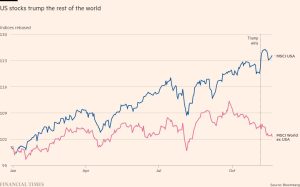Scholz says Germany opposes a Commerzbank takeover
Unlock the Editor’s Digest for free
Roula Khalaf, Editor of the FT, selects her favourite stories in this weekly newsletter.
German Chancellor Olaf Scholz has come out against a UniCredit takeover of Commerzbank after the Italian lender said it was raising its stake from about 9 per cent to 21 per cent.
UniCredit disclosed on Monday that it had taken a position in a further 11.5 per cent of Commerzbank’s shares, two weeks after it revealed a 9 per cent stake in the bank, half of it acquired from the German government.
Scholz told Reuters on the sidelines of a visit to New York on Monday that “unfriendly attacks [and] hostile takeovers are not a good thing for banks and that is why the German government has clearly positioned itself”.
UniCredit chief executive Andrea Orcel has previously said he would not pursue a tie-up with Commerzbank without the government’s support.
Although UniCredit has long eyed Commerzbank as a potential takeover, the emergence of the Italian bank as a major shareholder caught Germany’s establishment off-guard and ignited political opposition against a cross-border tie-up.
After UniCredit’s disclosure on Monday, a government official told the FT that Berlin “supports the strategy of Commerzbank which is geared towards independence”, stressing that “we do not support a takeover, and we have informed UniCredit about this”.
Unicredit’s latest stake-building and Berlin’s terse response mark a sharp escalation in an already acrimonious row between Commerzbank’s two largest shareholders.
UniCredit’s chief executive Andrea Orcel made his latest move after Berlin on Friday said it would no longer sell down its remaining 12 per cent holding in Commerzbank as planned, a response to mounting domestic opposition to a takeover.
Although UniCredit needs approval from the European Central Bank to lift its holding above 10 per cent, it has acquired the 11.5 per cent stake in such a way that the trade will not settle until “the required approvals have been obtained”.
However, if it does secure approval, UniCredit will leapfrog Berlin as Commerzbank’s largest shareholder, ratcheting up the pressure on the German government.
Italian foreign minister Antonio Tajani told the Class CNBC network on Monday that UniCredit was “doing well” to act within the EU’s internal market. Rome has signalled it is in favour of a takeover as long as UniCredit’s headquarters remain in Italy.
Shares in Commerzbank, which had lost more than 5 per cent in early trading on Monday, rebounded sharply after UniCredit’s announcement.
The stock is up some 24 per cent since UniCredit built its initial stake earlier this month. Shares in UniCredit lost 2.5 per cent on Monday but are still trading higher than before its stake became public knowledge almost two weeks ago.
A person familiar with the thoughts of Commerzbank’s top management said it was not immediately clear how UniCredit’s latest move fits with Orcel’s earlier statements that he would neither pursue a hostile takeover nor acquire Commerzbank against the will of the German government.
Commerzbank told the FT that it had “taken note” of UniCredit’s move and said that its boards were “always open to responsibly evaluating strategic options”. However it added that the interests of all stakeholders — investors, employees and clients — needed to be taken into account.
The Italian bank has already submitted a request to raise its interest to 29.9 per cent — a process that can take up to 90 days in complex cases. UniCredit would need to go back to the ECB if it wanted to raise its stake above 50 per cent.
A merger between the two groups would be the first significant cross-border bank deal in Europe since the financial crisis and a potential catalyst for further consolidation across the continent’s fragmented sector.
People familiar with the ongoing talks said UniCredit repeatedly asked the German government for a meeting after taking the 9 per cent stake but Berlin declined.
UniCredit declined to comment while the German government did not immediately respond to an FT request for comment.
Orcel has set his sights on acquiring European rivals, with the potential to turn the Italian lender into a vehicle for consolidating the sector.
But his move on Commerzbank has caused uproar in Germany, with politicians and labour unions opposing a full takeover.
Executives at Commerzbank have warned the German government that a tie-up with UniCredit could hobble lending to small and medium-sized Mittelstand companies, while unions have raised the prospect of job cuts.
Friedrich Merz, leader of the opposition, has also been highly critical of UniCredit’s latest move, saying a takeover of Commerzbank by the Italians would be a “disaster for the German banking sector”.
UniCredit and the German government have been at odds with each other on what information was shared with Berlin ahead of the stake building.
Orcel has publicly stated that UniCredit informed the German government of its existing position in Commerzbank’s shares before acquiring the block of stock that took its total position to 9 per cent and put the bank in play.
Officials in Berlin told the FT that they had not been informed until the last minute. People close to the talks said there were disagreements and a breakdown in communications within the German government.
The German government’s refusal to engage in negotiations over the sale of its remaining stake, prompted a change in strategy by UniCredit, according to two people familiar with the matter.
The Italian bank said in a statement on Monday announcing its increased stake that “there is substantial value that can be unlocked within Commerzbank, either standalone or within UniCredit, for the benefit of Germany and the bank’s wider stakeholders”.
It said the majority of its position had been hedged to “provide full flexibility and optionality to either retain its shareholding, sell its participation with a floored downside, or increase its stake further”.
#Scholz #Germany #opposes #Commerzbank #takeover




